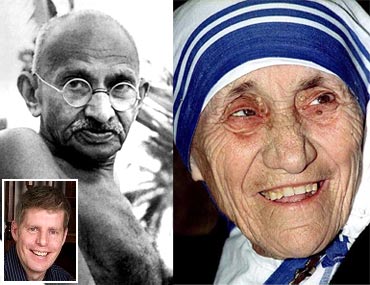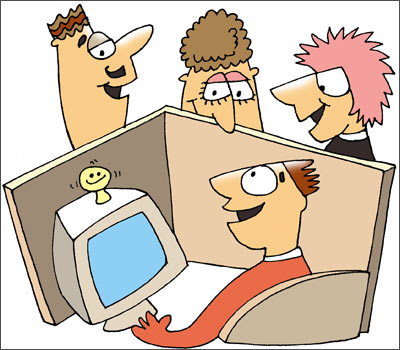 | « Back to article | Print this article |
World's best negotiators: Gandhi, Mother Teresa
Professor Peter Hiddema talks about how to master effective negotiating skills, offering examples of Mahatma and Mother Teresa
Peter Hiddema, a visiting professor at the INSEAD (France and Singapore) teaches negotiation skills to MBA students. Globally known as an expert in strategic negotiation, conflict resolution and leadership development, Peter has lectured students and corporate leaders at several universities including Queen's University (in Canada and the UK), HEC at L'Universit de Montr al, INSEAD (France) and Harvard University. Peter has also taught negotiations to working executives globally and according to information available with INSEAD, in the past 2 years alone, Peter has been an advisor on transactions totalling more than USD 2 billion.
Here are excerpts from an interaction with Peter Hiddema.
When did you start studying negotiations?
I was a corporate banker in Canada during the recession. Between 1991 and 1993, we had many clients losing money in their businesses and those going out of business. We were engaged in an incredible amount of negotiations with them we had to restructure their loans, put their firms in bankruptcy and all this talking was actually not serving anybody. Around then, my colleague walked in with a book called 'Getting to Yes' by Roger Fischer, William Ury and Bruce Patton, a book that had come from the Havard Negotiation Project.
We used that book and made some fundamental shifts and put ourselves in the shoes of the clients. We discussed the problems as if it was meant for both the parties to solve. It was very very rewarding; it helped and we got unbelievable success. That's when I realised the importance of negotiations.
Click NEXT to read more...
"We use negotiations to get what we want"
Are negotiations the most important factor in any deal?
A very important factor, although it is difficult to say whether it is the most important factor. Because we define negotiations as anything, we try to influence or persuade and we use negotiations to make our way in the world and get what we want.
With negotiations, we get people to work with us to find a spouse, to raise children to find jobs. And nothing like if we do it in a way it works well for both parties involved yes it is an important factor for both business and personal issues.
Can one learn to negotiate? Can it be taught in a class room, like it is being taught in b-schools these days?
Some may be are born with a gift; it depends on their personality style. An outgoing personality, one that is oriented towards people, comfortable with people with some level of charisma such people are more likely the guys who have a talent to negotiate.
However, it does not mean that they are better negotiators but that they have traits that will serve them well while negotiating. Yes, negotiations can be learnt in classrooms as long as it includes testing your beliefs and assumptions. And negotiations are like sports where people are born with a natural ability but they also have to practice to keep their skills doing well.
Click NEXT to continue
Women and men negotiate differently
Have you seen gender differences while doing research on this subject?
Yes, there are clear differences which have been studied.
Men are more focused on the substance of the negotiation over the relationship dynamics between or among the parties. In many cultures, men are raised to play competitive games, where the focus is on beating the opponent and where pushing for what you want is an important factor in success. Competition is encouraged, as is standing up for what you want.
A research done in the 1990's by Deborah Tannen in the United States showed that young boys and young girls played together very differently.
Young boys tended to play competitive games and even engaged in competitive dialogue, where they tried to show how one of them was better than the other. Their discussions tended to emphasise differences among them.
Even when discussing a subject, men will often engage in what is referred to as 'Ritual Opposition'. That is, they will oppose an idea for the purpose of bouncing it around and seeing how good it is. If it withstands the ritual opposition, it must be a good idea. And when it comes to making requests for what one wants, men tend to make requests that do not contain caveats.
For example, they will tend to say, "I would like x." They don't make excuses for it, they don't 'qualify' the request, they just make it simple and direct.
In general, women place a greater emphasis on the relationship dynamics of a negotiation than men do. Of course, the substance of the negotiation still matters, but they are more likely to make trade-offs on the substance for the sake of the relationship. This is congruent with how women are raised in many cultures: they are supposed be the peacemakers, the community builders, the ones who keep the family together, etc.
Deborah Tannen's research tended to emphasis that young girls find similarities in each other when playing games, and will even play games that demonstrate their similarities rather than differences.
When discussing a subject or idea, women tend not to engage in ritual opposition. If they have a concern, they are reasonably likely to raise it in the meeting, but only for the purpose of solving the problem at hand.
When faced with ritual opposition from men, women tend to shut down their idea generation. As far as making requests is concerned, women are more likely to make a request with 'caveats' in place. This sounds like, "If it's not too much trouble, could you " or "I would really like to take a week off, as long as it doesn't cause any extra workload on you and figure out solutions "
Click NEXT to continue
"Both should be happy, though not necessarily, equally"
Do negotiation patterns change culturally?
Needless to say, this has an impact. The primary differences are in the areas of relationships, and communication styles.
In the East, people generally place more emphasis on the relationship than in the West. They will invest considerable time in getting to know someone before doing business with them. In the West, people tend to get to the substance more quickly.
In terms of communication styles, the East will tend to be more indirect in the communication style, talking around the subject or using metaphors, while the West will tend to be more direct. There is another interesting difference regarding communication, which I refer to as communication patterns.
If one considers India and the US as examples, in India, it is common and accepted for people to talk 'over' one another and for more than one person to be talking simultaneously. In the US, that is generally considered rude. People tend to speak sequentially: that is, one person speaks, then another person speaks, then the first person speaks again. In arguments, of course people talk over each other and interrupt each other, but in this instance, I am referring to normal dialogue.
What is a successful negotiation? Can both parties ever be happy?
Both should be happy, though not necessarily equally. But yes, that the interests and the key needs, motivations and underlining drivers are in place is critical. A successful negotiation is that in which all the core needs of both the parties are met. And it should be better than any other alternative that could have been used. Better than walk away alternatives or what they could have done with a third party.
Click NEXT to continue
"Mahatma Gandhi, one of the best negotiators the world has seen"
Are there people you can brand as famous negotiators in the world?
Yes, to begin with, Mahatma Gandhi is possibly one of the best negotiators the world has seen. He accomplished many incredible things in his own way and managed to rally people together for a cause. Nelson Mandela would be very high on the list. Despite having spent years in jail, Mandela was not searching for revenge but reconciliation and a better future once out. He developed himself to a high level of intelligence. He accomplished what was impossible.
John F Kennedy was a terrific negotiator. He brought people of different viewpoints together and found commonality which he managed to make surface together. Not to forget Simon Bolivar, the Latin American revolutionary. He did significant work in South America and helped people gain independence. Martin Luther King Jr who rallied people around a cause, inspired them to take action. Mother Teresa, who on a moral high road accomplished so much.
Click NEXT to continue
"Treat the other part as a joint problem solver party"
Which are the usual negotiation mistakes that people make?
To list a few,
- Addressing the prospect's position instead of their underlying interests
- Selling a product instead of meeting needs
- Acting on untested assumptions about buying behaviour
- Asking too few questions and not doing enough listening
- Negotiating against yourself with one-sided concessions
To elaborate, we tend to make worse-case assumptions about why people do things. We don't test these assumptions and these assumptions put us into our prisons. We create trouble for ourselves. We believe that the pie is fixed and that resources, time and money is limited. In any situation we can always destroy the value benefit which means the pie is not fixed and this means we can create the opportunity and money and it is not limited.
We also always think that an initial demand that a person makes is always in his own interest and that is a wrong way of seeing a negotiation. We also believe that if the walk-away party is bad, the other party has an advantage and that you are weak means that the other party is strong. We also tend to treat negotiations as a battle or enemy. We should in fact treat the other part as a joint problem solver party.
The above could also serve as secrets for good negotiations?
Yes, things one could do are
- Expand the pie. We walk into the negotiations saying there is scarcity and that there is just so much to go around. We can create scarcity by our choices and approach or create abundance. Better to divide large scale resources and opportunity and the difference is in the approach.
- Treat negotiation as a puzzle which needs to be solved rather than a battle to be won. Treat your opponent as a problem to solve rather than an enemy.
- We make assumptions due to survival instinct. We make assumptions about people we are not charitable about. We believe others are ill-intentioned and not doing the right things.
- Focus on interests and not positions. We define interests as underlying motivators for the negotiations. Position is one way to meet interest but not the only way. Positions are 'what' and interests are 'why'.
- Always know your BATNA (Best Alternative To a Negotiated Agreement) and consider the other person's BATNA. If you don't know what your walk away alternatives are like, how can you determine the solution you are working out is good for you or not?
- Make negotiations win-win. If it is not good for both parties, it will not be endurable. You should be respectful of the people you are negotiating with. You should not cave in on your own interest but be flexible on how you get it.
Click NEXT to continue
"Focus first on their needs, and build your bridge from there"
Doesn't negotiating really just mean marketing an idea or point of view?
No matter what industry you're in, you have some set of products and/or services to sell. But here's what too many salespeople overlook these products or services were created to address a need or want, and the only reason the prospect is talking to you is because they have an unmet need or want. So if you want to sell the product, make sure you know what their need is before you talk about product wonders.
It may be the most intriguing creation on the planet, but if it doesn't meet the prospect's need, good luck.
Focus first on their needs, and build your bridge from there. And by the way, if you discover that you can't fill that need, move on. Trying to force a mismatch is a waste of everyone's time and it could come back to haunt you.
Too few questions and not enough listening are flaws too?
Many salespeople are extroverts and love to talk. I understand I'm an extrovert too! But here's the problem: when we're talking, we're not learning. 'But I'm not here to learn; I'm here to sell!' is what most salespeople say. Fair enough, but as you probably know from experience, it's hard to sell if you don't know why someone's buying. So ask.
Ask short, open-ended questions like: 'What's your concern?' 'Can you tell me more about that?' 'Can you help me understand that better?' Then be quiet and listen! By the way, this does not mean "Use the time to plan your next brilliant line."
Get curious. Hear them out. Summarise what you think they said to make sure you heard it right. Ask clarifying questions. Then make the sale.







